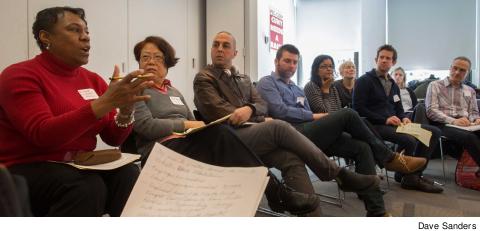The ‘adhesion’ campaign
 |
PSC activists from around CUNY gathered at the PSC Union Hall for an all-day strategy session in March to discuss the issue of a new reality where public-sector unions may not be able to collect agency shop fees.
At issue is an impending Supreme Court ruling that could come as early as next year, undoing a four-decade precedent that allows public-sector unions to collect agency shop fees from workers in a bargaining unit who don’t join the union, since they still benefit from the union representation and collective bargaining.
ONE-ON-ONE CONVERSATIONS
PSC members discussed how over the course of the next several months, chapter chairs, delegates and rank-and-file activists will go around their campuses to have one-on-one conversations with members, talking about the benefits of not just being a union member but of being an active and involved union member, and how union services like collective bargaining, grievance handling and organizing help make their jobs better.
Union activists will be asking their fellow members to sign recommitment cards as a way of building cohesion as the likelihood of a loss of agency shop fees in the public sector appears to grow.
During the training sessions in March, activists broke out into groups and practiced one-on-one conservations with members who might not be familiar with all of the benefits they receive from being in a union or are unaware of the judicial campaign anti-union organizations have waged to undercut the organizational and political power of labor unions. Many activists said it was paramount to impress upon members that the loss of agency shop fees would impede the ability of unions like the PSC to provide essential union services.
Last year, public-sector unions were bracing themselves for a crushing blow from the Supreme Court in the case of Friedrichs v. California Teachers Association. Most expected a 5-4 decision overturning a 1977 precedent set by Abood v. Detroit Board of Education, making it impossible for unions to require agency shop fees from non-members. When conservative justice Antonin Scalia suddenly died before a decision could be handed down, the court deadlocked on the case at 4-4, upholding the lower court’s ruling, which was in favor of the Abood precedent.
SUPREME COURT CONFIRMATION
It was a brief reprieve. With President Donald Trump’s conservative court appointee Neil Gorsuch currently under review by the Senate, it is widely considered that, if confirmed, he will vote with the conservative bloc against labor when another right-to-work case comes to the high court. Observers have noted that in his time as a circuit court judge, Gorsuch has reliably been friendly toward employers in cases involving labor disputes; he famously dissented in a case finding that a trucking company wrongfully fired a driver who abandoned his broken-down truck for fear of freezing in the cabin in extreme winter weather.
And another case on agency shop fees is on the way. On March 21, the Seventh Circuit Court of Appeals dismissed the case Janus v. AFSCME, although the crux of the decision was procedural and not necessarily an ideological defense of the current agency shop fee system. But this sets up the very distinct possibility that Janus, which argues that agency shop workers should be able to opt out of paying fees to the union, could be coming to the Supreme Court, ending up in a decision that reworks public-sector labor relations nationwide.
JUDICIAL STRATEGY
“The National Right to Work Legal Defense Foundation has attempted to rush Janus through the courts, just like Friedrichs was rushed, by admitting at every stage that it should be dismissed. They are now prepared to appeal the matter to the Supreme Court,” labor lawyer Moshe Marvit told Clarion. “If [the Supreme Court] takes the case, there’s a new round of briefing, and then it’s set for argument. So, it’s not inconceivable that the matter could be heard next term.”

